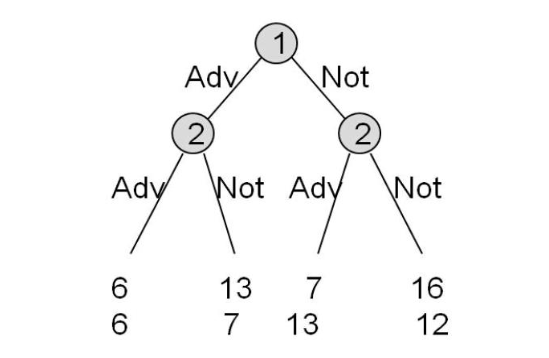Game Theory: Concepts, Applications, and Insights from Operations Research
DOI:
https://doi.org/10.5281/zenodo.13924241ARK:
https://n2t.net/ark:/40704/JCTAM.v1n4a07Disciplines:
Applied MathematicsSubjects:
Game TheoryReferences:
28Keywords:
Game Theory, Nash Equilibrium, Mixed Strategy, Operational Research, Cooperative GamesAbstract
Game theory is a branch of complex system analysis that deals with the mathematical modeling of strategic interactions among rational agents. It has been widely used across various fields, such as economics, social sciences, computer science, and operational research. This paper provides an overview of game theory, discussing its foundational concepts, including non-cooperative and cooperative games, Nash equilibrium, and mixed strategies. The study explores extensive-form, repeated, Bayesian, and coalitional games, highlighting applications in operational research and the implications for decision-making under competition.
References
Alesina, A. (1987). Macroeconomic policy in a two-party system as a repeated game. The Quarterly journal of economics, 102(3), 651-678.
Azar, O. H.-E. (2011). Do soccer players play the mixed-strategy Nash equilibrium? Applied Economics, 43(25), 3591-3601.
Yan, Y., Deng, Y., Cui, S., Kuo, Y. H., Chow, A. H., & Ying, C. (2023). A policy gradient approach to solving dynamic assignment problem for on-site service delivery. Transportation Research Part E: Logistics and Transportation Review, 178, 103260.
Coursera. (2021, 10 18). 7-3 The Shapley Value. Retrieved from Game Theory: https://www.coursera.org/learn/game-theory-1/lecture/fWSQi/7-3-the-shapley-value
Dekel, E. F. (2004). Learning to play Bayesian games. Games and Economic Behavior, 46(2), 282-303.
Yan, Y., Chow, A. H., Ho, C. P., Kuo, Y. H., Wu, Q., & Ying, C. (2022). Reinforcement learning for logistics and supply chain management: Methodologies, state of the art, and future opportunities. Transportation Research Part E: Logistics and Transportation Review, 162, 102712.
Liu, T., & Meidani, H. (2024). End-to-end heterogeneous graph neural networks for traffic assignment. Transportation Research Part C: Emerging Technologies, 165, 104695.
Cheng, X., & Lin, J. (2024). Is electric truck a viable alternative to diesel truck in long-haul operation?. Transportation Research Part D: Transport and Environment, 129, 104119.
Holt, C. A. (2004). The Nash equilibrium: A perspective. Proceedings of the National Academy of Sciences, 101(12), 3999-4002.
Jackson, M. O. (2011, December 5). A Brief Introduction to the Basics of Game Theory. Retrieved from SSRN: https://ssrn.com/abstract=1968579 or http://dx.doi.org/10.2139/ssrn.1968579
Kroer, C. &. (2014, June). Extensive-form game abstraction with bounds. In Proceedings of the fifteenth ACM conference on Economics and computation, pp. 621-638.
Myerson, R. B. (2013). Game theory. Harvard university press.
Cheng, X., Mamalis, T., Bose, S., & Varshney, L. R. (2024). On Carsharing Platforms With Electric Vehicles as Energy Service Providers. IEEE Transactions on Intelligent Transportation Systems.
Ormerod, R. J. (2010). OR as rational choice: A decision and game theory perspective. Journal of the Operational Research Society, 61(12), 1761-1776.
Osborne, M. J. (2004). An introduction to game theory (Vol. 3, No. 3). New York: Oxford university press.
Selten, R. (1975). Reexamination of the Perfectness Concept for Equilibrium Points in Extensive Games. International Journal of Game Theory, pp. 4:25 - 55.
Liu, T., & Meidani, H. (2024). Neural network surrogate models for aerodynamic analysis in truck platoons: Implications on autonomous freight delivery. International Journal of Transportation Science and Technology.
Wikiperdia. (2021, 10 13). Game theory. Retrieved from https://en.wikipedia.org/wiki/Game_theory#Cooperative_/_non-cooperative
Cheng, X., Nie, Y. M., & Lin, J. (2024). An autonomous modular public transit service. Transportation Research Part C: Emerging Technologies, 104746.
Liu, T., & Meidani, H. (2024). Graph Neural Network Surrogate for Seismic Reliability Analysis of Highway Bridge Systems. Journal of Infrastructure Systems, 30(4), 05024004.
Guo, G., Li, X., Zhu, C., Wu, Y., Chen, J., Chen, P., & Cheng, X. (2025). Establishing benchmarks to determine the embodied carbon performance of high-speed rail systems. Renewable and Sustainable Energy Reviews, 207, 114924.
Che, C., Lin, Q., Zhao, X., Huang, J., & Yu, L. (2023, September). Enhancing Multimodal Understanding with CLIP-Based Image-to-Text Transformation. In Proceedings of the 2023 6th International Conference on Big Data Technologies (pp. 414-418).
Che, C., Hu, H., Zhao, X., Li, S., & Lin, Q. (2023). Advancing Cancer Document Classification with R andom Forest. Academic Journal of Science and Technology, 8(1), 278-280.
Huang, Z., Zheng, H., Li, C., & Che, C. (2024). Application of machine learning-based k-means clustering for financial fraud detection. Academic Journal of Science and Technology, 10(1), 33-39.
Huang, Z., Che, C., Zheng, H., & Li, C. (2024). Research on Generative Artificial Intelligence for Virtual Financial Robo-Advisor. Academic Journal of Science and Technology, 10(1), 74-80.
Che, C., Huang, Z., Li, C., Zheng, H., & Tian, X. (2024). Integrating generative AI into financial market prediction for improved decision making. Applied and Computational Engineering, 64, 155-161.
Che, C., Li, C., & Huang, Z. (2024). The Integration of Generative Artificial Intelligence and Computer Vision in Industrial Robotic Arms. International Journal of Computer Science and Information Technology, 2(3), 1-9.
Liu, H., Wang, C., Zhan, X., Zheng, H., & Che, C. (2024). Enhancing 3D Object Detection by Using Neural Network with Self-adaptive Thresholding. arXiv preprint arXiv:2405.07479.

Downloads
Published
How to Cite
Issue
Section
ARK
License
Copyright (c) 2024 The author retains copyright and grants the journal the right of first publication.

This work is licensed under a Creative Commons Attribution 4.0 International License.


















